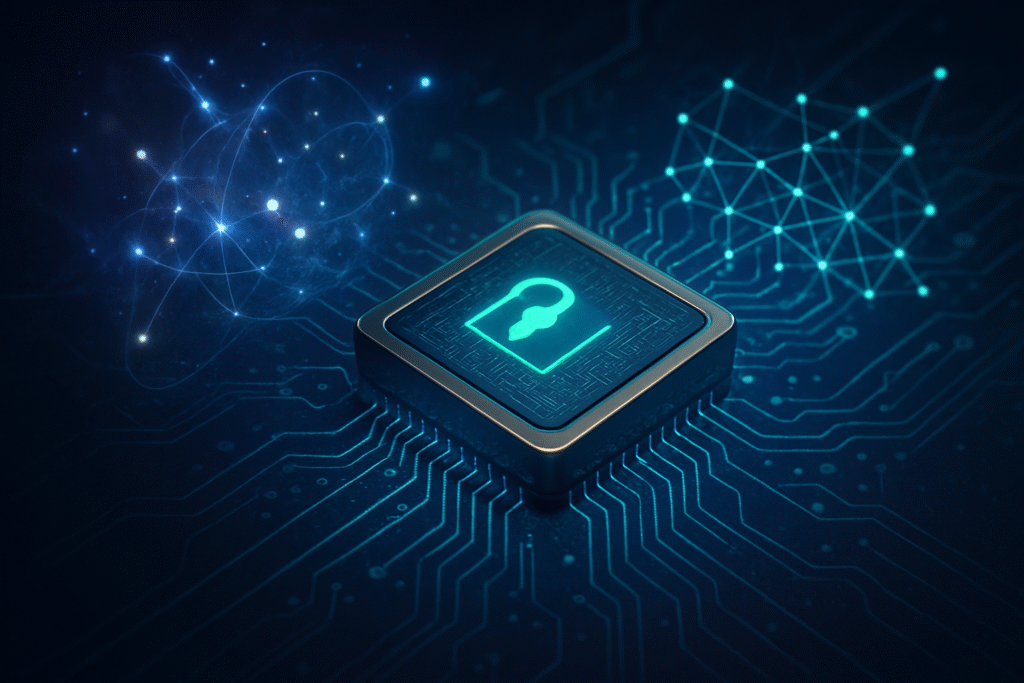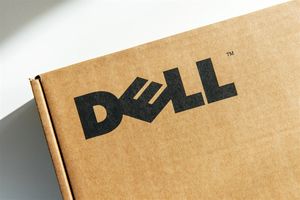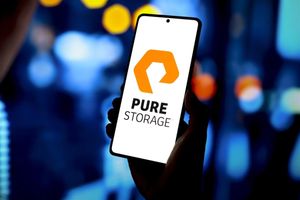
New York, NY – October 14, 2025 – In a move set to significantly fortify the cybersecurity landscape for artificial intelligence, SEALSQ Corp (NASDAQ: LAES) and Trusted Semiconductor Solutions (TSS) have announced a strategic partnership aimed at developing "Made in US" Post-Quantum Cryptography (PQC)-enabled secure semiconductor solutions. This collaboration, officially announced on October 9, 2025, and slated for formalization at the upcoming Quantum + AI Conference in New York City (October 19-21, 2025), is poised to deliver unprecedented levels of hardware security crucial for safeguarding critical U.S. defense and government AI systems against the looming threat of quantum computing.
The alliance marks a proactive and essential step in addressing the escalating cybersecurity risks posed by cryptographically relevant quantum computers, which could potentially dismantle current encryption standards. By embedding quantum-resistant algorithms directly into the hardware, the partnership seeks to establish a foundational layer of trust and resilience, ensuring the integrity and confidentiality of AI models and the sensitive data they process. This initiative is not merely about protecting data; it's about securing the very fabric of future AI operations, from autonomous systems to classified analytical platforms, against an entirely new class of computational threats.
Technical Deep Dive: Architecting Quantum-Resistant AI
The partnership between SEALSQ Corp and TSS is built upon a meticulously planned three-phase roadmap, designed to progressively integrate and develop cutting-edge secure semiconductor solutions. In the short-term, the focus will be on integrating SEALSQ's existing QS7001 secure element with TSS’s trusted semiconductor platforms. The QS7001 chip is a critical component, embedding NIST-standardized quantum-resistant algorithms, providing an immediate uplift in security posture.
Moving into the mid-term, the collaboration will pivot towards the co-development of "Made in US" PQC-embedded integrated circuits (ICs). These ICs are not just secure; they are engineered to achieve the highest levels of hardware certification, including FIPS 140-3 (a stringent U.S. government security requirement for cryptographic modules) and Common Criteria, along with other agency-specific certifications. This commitment to rigorous certification underscores the partnership's dedication to delivering uncompromised security. The long-term vision involves the development of next-generation secure architectures, which include innovative Chiplet-based Hardware Security Modules (CHSMs) tightly integrated with advanced embedded secure elements or pre-certified intellectual property (IP).
This approach significantly differs from previous security paradigms by proactively addressing quantum threats at the hardware level. While existing security relies on cryptographic primitives vulnerable to quantum attacks, this partnership embeds PQC from the ground up, creating a "quantum-safe" root of trust. TSS's Category 1A Trusted accreditation further ensures that these solutions meet the stringent requirements for U.S. government and defense applications, providing a level of assurance that few other collaborations can offer. The formalization of this partnership at the Quantum + AI Conference speaks volumes about the anticipated positive reception from the AI research community and industry experts, recognizing the critical importance of hardware-based quantum resistance for AI integrity.
Reshaping the Landscape for AI Innovators and Tech Giants
This strategic partnership is poised to have profound implications for AI companies, tech giants, and startups, particularly those operating within or collaborating with the U.S. defense and government sectors. Companies involved in critical infrastructure, autonomous systems, and sensitive data processing for national security stand to significantly benefit from access to these quantum-resistant, "Made in US" secure semiconductor solutions.
For major AI labs and tech companies, the competitive implications are substantial. The development of a sovereign, quantum-resistant digital infrastructure by SEALSQ (NASDAQ: LAES) and TSS sets a new benchmark for hardware security in AI. Companies that fail to integrate similar PQC capabilities into their hardware stacks may find themselves at a disadvantage, especially when bidding for government contracts or handling highly sensitive AI deployments. This initiative could disrupt existing product lines that rely on conventional, quantum-vulnerable cryptography, compelling a rapid shift towards PQC-enabled hardware.
From a market positioning standpoint, SEALSQ and TSS gain a significant strategic advantage. TSS, with its established relationships within the defense ecosystem and Category 1A Trusted accreditation, provides SEALSQ with accelerated access to sensitive national security markets. Together, they are establishing themselves as leaders in a niche yet immensely critical segment: secure, quantum-resistant microelectronics for sovereign AI applications. This partnership is not just about technology; it's about national security and technological sovereignty in the age of quantum computing and advanced AI.
Broader Significance: Securing the Future of AI
The SEALSQ and TSS partnership represents a critical inflection point in the broader AI landscape, aligning perfectly with the growing imperative to secure digital infrastructures against advanced threats. As AI systems become increasingly integrated into every facet of society—from critical infrastructure management to national defense—the integrity and trustworthiness of these systems become paramount. This initiative directly addresses a fundamental vulnerability by ensuring that the underlying hardware, the very foundation upon which AI operates, is impervious to future quantum attacks.
The impacts of this development are far-reaching. It offers a robust defense for AI models against data exfiltration, tampering, and intellectual property theft by quantum adversaries. For national security, it ensures that sensitive AI computations and data remain confidential and unaltered, safeguarding strategic advantages. Potential concerns, however, include the inherent complexity of implementing PQC algorithms effectively and the need for continuous vigilance against new attack vectors. Furthermore, while the "Made in US" focus strengthens national security, it could present supply chain challenges for international AI players seeking similar levels of quantum-resistant hardware.
Comparing this to previous AI milestones, this partnership is akin to the early efforts in establishing secure boot mechanisms or Trusted Platform Modules (TPMs), but scaled for the quantum era and specifically tailored for AI. It moves beyond theoretical discussions of quantum threats to concrete, hardware-based solutions, marking a significant step towards building truly resilient and trustworthy AI systems. It underscores the recognition that software-level security alone will be insufficient against the computational power of future quantum computers.
The Road Ahead: Quantum-Resistant AI on the Horizon
Looking ahead, the partnership's three-phase roadmap provides a clear trajectory for future developments. In the near-term, the successful integration of SEALSQ's QS7001 secure element with TSS platforms will be a key milestone. This will be followed by the rigorous development and certification of FIPS 140-3 and Common Criteria-compliant PQC-embedded ICs, which are expected to be rolled out for specific government and defense applications. The long-term vision of Chiplet-based Hardware Security Modules (CHSMs) promises even more integrated and robust security architectures.
The potential applications and use cases on the horizon are vast and transformative. These secure semiconductor solutions could underpin next-generation secure autonomous systems, confidential AI training and inference platforms, and the protection of critical national AI infrastructure, including power grids, communication networks, and financial systems. Experts predict a definitive shift towards hardware-based, quantum-resistant security becoming a mandatory feature for all high-assurance AI systems, especially those deemed critical for national security or handling highly sensitive data.
However, challenges remain. The standardization of PQC algorithms is an ongoing process, and ensuring interoperability across diverse hardware and software ecosystems will be crucial. Continuous threat modeling and the attraction of skilled talent in both quantum cryptography and secure hardware design will also be vital for sustained success. What experts predict is that this partnership will catalyze a broader industry movement towards quantum-safe hardware, pushing other players to invest in similar foundational security measures for their AI offerings.
A New Era of Trust for AI
The partnership between SEALSQ Corp (NASDAQ: LAES) and Trusted Semiconductor Solutions (TSS) represents a pivotal moment in the evolution of AI security. By focusing on "Made in US" Post-Quantum Cryptography-enabled secure semiconductor solutions, the collaboration is not just addressing a future threat; it is actively building a resilient foundation for the integrity of AI systems today. The key takeaways are clear: hardware-based quantum resistance is becoming indispensable, national security demands sovereign supply chains for critical AI components, and proactive measures are essential to safeguard against the unprecedented computational power of quantum computers.
This development's significance in AI history cannot be overstated. It marks a transition from theoretical concerns about quantum attacks to concrete, strategic investments in defensive technologies. It underscores the understanding that true AI integrity begins at the silicon level. The long-term impact will be a more trusted, resilient, and secure AI ecosystem, particularly for sensitive government and defense applications, setting a new global standard for AI security.
In the coming weeks and months, industry observers should watch closely for the formalization of this partnership at the Quantum + AI Conference, the initial integration results of the QS7001 secure element, and further details on the development roadmap for PQC-embedded ICs. This alliance is a testament to the urgent need for robust security in the age of AI and quantum computing, promising a future where advanced intelligence can operate with an unprecedented level of trust and protection.
This content is intended for informational purposes only and represents analysis of current AI developments.
TokenRing AI delivers enterprise-grade solutions for multi-agent AI workflow orchestration, AI-powered development tools, and seamless remote collaboration platforms.
For more information, visit https://www.tokenring.ai/.





